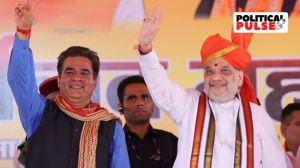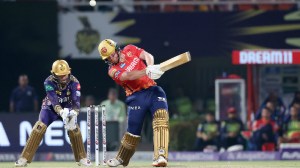- India
- International
Two yrs after town’s first-ever riots, Kosi Kalan shadow hangs large over Mathura
How riots will impact polls in UP.
The Muzaffarnagar violence in September 2013 has left Uttar Pradesh plunged into its most polarised general elections in two decades. But before the clashes in western UP that left more than 70 dead, came smaller, more isolated sectarian skirmishes across the state.
From Pratapgarh and Faizabad in the east to Mathura, Bareilly, Bijnore, Allahabad, Bulandshahr, Meerut and Sambhal nearer to Muzaffarnagar, the riots broke out in mostly cities and towns that remained untouched even in the aftermath of the Babri Masjid demolition of 1992.
As per the Samajwadi Party government figures, the state witnessed 27 riots between March 2012, when it took over, and March 2013. From charges of molestation of women to minor road accidents, from the alleged desecration of holy books and places of worship to financial disputes, the sparks for these riots were minor and the violence defied reason.
Now, with families shattered, homes burnt to the ground and confidence in the police and administration at its lowest, these scarred parts of UP look set to vote on one issue alone — religion.
Kosi Kalan (Mathura constituency)
Candidates: Hema Malini (BJP); Jayant Choudhary (RLD); Chandan Singh (Samajwadi Party); Yogesh Dwivedi (BSP)
Polling: April 24

The fires in Kosi Kalan town were born of water. On June 1, 2012, a minor scuffle broke out between Hindus and Muslims, leading to nine hours of violence that that left four dead, dozens injured and shops and houses gutted. In the town that had never seen a Hindu-Muslim clash before, curfew had to be imposed for 21 days before a semblance of normalcy returned.
The rioting began after a shopkeeper relieved himself and washed his hands from a drum of water kept outside a masjid in Kosi Kalan just minutes before Friday prayers. An alarm was sounded and those attending the prayers rushed out to protest. Police sources say an altercation ensued and the shopkeeper was slapped. However, following apologies, Friday prayers resumed.
“The situation had been resolved and we returned to the masjid. But 20 minutes later, there was a mob waiting outside armed with sticks. Others began pelting stones, we hid inside rooms,” a cleric at the masjid who preferred to remain anonymous recalls. He omits the part about the shopkeeper having been slapped.
This was at 2 pm. The men holed up inside the masjid were rescued only three hours later after a heavily armed police convoy dispersed the rioters.
By then, violence spread across the city, reaching its peak in Talab Shahi, where Hindu and Muslim housing colonies are located next to each other. Twin brothers Bhura and Kalua were thrown alive into a blazing fire, Salauddin Sheikh was shot dead as was Sonu Saini.
The clashes happened one day before local municipal council elections in Kosi Kalan. In the rescheduled polls, held after 45 days, the BJP won with a thumping majority.
“In the end, all local issues were forgotten,” admits Bhagwat Prasad Ruhela, who heads the BJP-ruled council. “Muslims barely voted and I won by more than 3,000 votes, the highest in over a decade.”
Almost two years later, memories remain but versions differ. A witness to the attack on the masjid says Hindu-Muslim ties are back to normal. “There is some tension, some ill-will but mostly on party lines. For common people, business is more important,” he says.
But that’s not how Ruhela, claiming to speak for the Hindu community, sees it. “That day changed this town. Miscreants thought they were unassailable and went on a rampage. We were lucky that phone calls were made and farmers from surrounding villages came to help. Now Muzaffarnagar has happened. This is an important election for all Hindus,” he says.
In April 2013, a local daily reported that Abdul Karim Tunda, an alleged terrorist, was spotted in Kosi Kalan and indicated that he could have been involved in the riots (Tunda was arrested three monts later from the Nepal border). The police have registered an FIR against the publication’s reporters. “They have registered cases against us for being involved in the riots as well. This is the SP government, they will do anything to save their skin,” said one of the reporters.
Mathura’s Lok Sabha candidates have stayed well away from the Kosi Kalan incident. While Hema Malini visited the outskirts of the town, Jayant Choudhary spent a couple of hours one day here. Chandan Singh and Yogesh Dwivedi are yet to visit.
However, a senior BSP leader says, “This is an issue across the Mathura constituency. Most people still remember it and we believe it will affect a substantial percentage of the vote.”
Jats, Thakurs and Brahmins number three lakh each in this constituency of 12 lakh voters, with Muslims making up around 12 per cent of the vote. As Nazar Mohammad, a tailor in Kosi Kalan, says, that doesn’t leave them with much choice.
“We will vote for the party that can defeat the BJP even if it means the RLD (Rashtriya Lok Dal), which is a party for Jats. That is a problem since Jats have killed Muslims in Muzaffarnagar and Ajit Singh has allied with the BJP before,” he says.
Tracking the family of Sonu Saini, who died in the 2012 clash, is easy. They live on the edge of the Hindu colony bordering the Muslim one and many are only too keen to take the media to meet his family. The 26-year-old’s death left his wife and four children — the eldest 8 — without a breadwinner. Sonu had been putting his snack counter in place when he was shot in the chest.
His wife Savitri says, “My brother-in-law helps us. He runs a vegetable stand. My children cannot go to school, we have no food and you come here to talk to me? What good is talk?”
A few hundred meters away, on the Muslim side, 65-year-old Makhmal grieves for her twins. “Bhura and Kalua, 24, were trying to come back home when Bhura was shot. Kalua was taking him to a hospital when they were caught by a mob. They were thrown alive into a pile of burning tyres. Kalua managed to wriggle out but they caught him again, cut his hands and threw him back in. What sort of barbaric time do we live in?”
The SP government had announced Rs 5 lakh as compensation. “I have five mouths to feed. What good is this money? It is almost over,” says Savitri.
In Makhmal’s case, the relief went to her sons’ wives. “They took the money and returned to their villages. I have nothing left but gracious neighbours,” she says.
Savitri and Makhmal are divided by religion, but together in grief and united by contempt. “Vote for what?” they say. “There is no use voting.”
Apr 26: Latest News
- 01
- 02
- 03
- 04
- 05







































